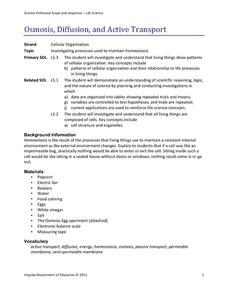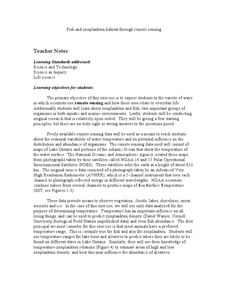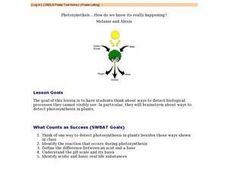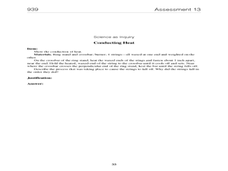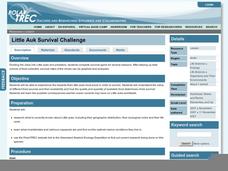Curated OER
Simple Machines IV - Levers
The lever is an everyday simple machine. Youngsters learn the principles of levers and explore their many uses. Groups of pupils perform a simple lab where they lift objects with a fulcrum while placing the load in a variety of...
Curated OER
DNA on Stick
Students experience a "hands-on" activity to get visual evidence of the physical nature of DNA and the process of DNA purification. They explore one method of chromosomal DNA isolation and DNA extraction.
Florida International University
The Good, the Bad and the Nasty Tasting
Examine the benefits of chemical defense mechanisms. Organisms in oceans use chemicals to ward off predators. Duplicate this adaptation using a hands-on experiment in which you ward off your predators (your pupils) with some bad-tasting...
Virginia Department of Education
Osmosis, Diffusion, and Active Transport
No, it really is okay to play with your food! Emerging scientists manipulate popcorn, eggs, and other household objects as they demonstrate multiple cellular processes. The activity, capable of modifications, is designed to reflect the...
Curated OER
Our Disastrous World
Students explore natural disasters around the world from the experiences of other students, friends and families. They collaborate with countries such as Japan, China, India, Australia, Russia, Great Britain as well as from the United...
Curated OER
It's a Gas! Or is it?
Oceanography enthusiasts are given a series of thought experiments to consider in order to relate the solubility of gases and solids to underwater volcanoes. It is not particularly engaging to perform these thought experiments. Choose...
Curated OER
Fish and Zooplankton Through Remote Sensing
Ecology aces examine sea surface temperature maps and relate temperatures to concentration in fish and zooplankton populations. Take your class to a computer lab and provide experience with actual remote sensing data. Some of the links...
TED-Ed
How Does Your Brain Respond to Pain?
Zap! Ouch! That hurts! But why? And how come people don't experience or respond to pain in the same way? Take a journey on the sensing pathway, from your nociceptors, along your nerves, up your spinal cord, to neurons and glial, through...
Curated OER
The Transfer of Energy 3: Rust and Corrosion
Middle schoolers research the type of chemical reaction that occurs when metal rusts. They conduct an experiment looking at the rate of corrosion in steel wool. This is lesson three in a three lesson unit on the transfer of energy.
Space Awareness
The Big Meltdown
Explore the world (our world) of melting ice caps. Why are these caps melting? What is the effect of melting ice caps? Dive into the ever-present issue of global warming with a resource that has learners looking at data and participating...
Chicago Botanic Garden
Are All Plants Created Equal?
Photosynthesis requires energy and produces food, and cellular respiration produces energy and requires food. An interesting lesson analyzes the factors that affect the rates of photosynthesis and respiration. Classes spend one day...
Space Awareness
Climate Zones
The climate at the equator is hotter than the climate at the poles, but why? The lesson plan goes in depth, explaining how the angles of illumination relate to the heating rate at different latitudes and seasons. Scholars use a strong...
Curated OER
Sink or Float?
Students investigate whether different objects sink or float in water using the Scientific Method. They listen to the book "Christopher Columbus" by Stephen Krensky, identify the steps of the Scientific Method, conduct the sink or float...
Curated OER
Photosynethsis....How do we know it's really happening? - Biology Teaching Thesis
Students think of one way to detect photosynthesis in plants besides those ways shown in class. They identify the reaction that occurs during photosynthesis. Students define the difference between an acid and a base. They identify acidic...
Curated OER
Sand Explorations
Students experiment with different samples of sand from Maui leeward and windward beaches. They create a sand map to suggest at least one contributing factor for the formation of each beach sample. They test the samples to determine...
Curated OER
Light Stick Chemistry
In groups of three with the lights off and the shades drawn, investigators place inactivated light sticks, in three beakers: one filled with ice water, another with lukewarm water, and the other with room temperature water. They wait...
Curated OER
Evidence of Heat Transformations
Earth, life, and physical science classes can all benefit from understanding heat transfer. There is not room enough to describe these seven exceptional laboratory experiments that explore conduction, convetcion, and radiation. Several...
Curated OER
Chilean Sea Bass
Introduce your mini-marine biologists to using databases. Tables of how many Chilean Sea Bass were caught and number of hours spent fishing are examined. Using the data, individuals calculate the "Catch per Unit of Effort" for each year....
Curated OER
Little Auk Survival Challenge
A bird's life is one of danger and intrigue as it struggles for survival in sometimes harsh environments. To understand how difficult surviving in the wild can be, children play a simulation game where they act as little auks, birds from...
Curated OER
Hubris Lesson Plan
Bring this lesson on hubris to your short story unit. After reading Jack London's "To Build a Fire," young readers discuss the role of hubris in the protagonist's death. The lesson has connections to other short stories, such as "The...
Curated OER
Towers of the Lost City
Middle school marine scientists compare the pH change in distilled and saltwater as acetic acid is added one drop at a time. Then they compare the pH change in both when sodium hydroxide is added. This experiment demonstrates the...
Curated OER
Gasoline Additive
Chemists consider a situation in which an ethanol producer needs to determine how much to add to t-butanol to prevent freezing during transport. They work in the laboratory to obtain the freezing point depression constant for the...
Curated OER
Pandora's Box
Some of today's technologies are controversial, in vitro fertilization being one of them. Mature high school biology classes examine the technology involved in and dilemmas created by this procedure. They play different roles in an...
Curated OER
Leaves, the Sun, and the Water Cycle
As a way to combine life and physical science, or simply as an investigation of plant transpiration, this lesson is sure to inspire! Middle schoolers capture the moisture given off by plants that are placed in different conditions. They...





